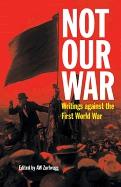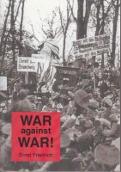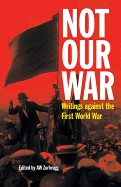 In the UK, the centenary of the First World War has already prompted a deluge of books, events and media coverage. The BBC alone has announced 2,500 hours of programmes, which – like 99% of the mainstream response – will doubtless run the A to B of the mainstream political spectrum.
In the UK, the centenary of the First World War has already prompted a deluge of books, events and media coverage. The BBC alone has announced 2,500 hours of programmes, which – like 99% of the mainstream response – will doubtless run the A to B of the mainstream political spectrum.
True, Thatcherite historian and apologist for imperialisms past and present, Niall Ferguson, was granted 90 mins on BBC2 to argue that Britain should have stayed out of the war, at least at the outset. In his view, it was ‘a great mistake’.
Even this had to be ‘balanced’ by an hour-long slot with former Telegraph editor Max Hastings, arguing that Britain’s participation was ‘tragically necessary’.
Almost completely absent, it seems, are the voices and arguments of those such as Rosa Luxemburg and Eugene Debs, who opposed the First World War and took action to stop it, often at considerable personal risk (both served substantial jail terms, and Luxemburg was murdered at the war’s end).
Merlin’s new anthology of contemporary writings by the war’s opponents – some of whose texts appear here in English for the first time – is therefore especially welcome.
To be sure, the range of opposition represented is not quite as broad as advertised on the blurb: there are definitely far more anarchists and socialists than feminists, liberals, religiously-motivated pacifists or independently-minded radicals. (Bertrand Russell, who probably falls in this last category, is notable by his absence.) However, I suspect that all but the most expert readers will find at least something new.
Two pieces that stood out for me were a brilliantly-contemptuous anti-war poem that appeared in the working class paper _The Firth Worker_ shortly before its suppression, and feminist Hélène Brion’s note to the leader of the French metal workers, in which she quoted the words of 19th century socialist Victor Considérant: ‘When women are initiated into social questions, revolutions will no longer be made with rifle fire.’
Elsewhere, in one of the book’s longest extracts, Lenin (in 1916) reveals his true colours, railing against the ‘reactionary Christian socialists’ advocating disarmament, whom he takes to task for their ‘aversion... to bloodshed, death etc....’ as a result of the war.
‘[D]o the advocates of disarmament stand for an altogether new kind of revolution, unarmed revolution?’ he asks increduously, perhaps forgetting that one of his two ‘world-historical facts’, the 1905 Russian revolution, was a predominantly nonviolent affair.
Though it now appears to be generally acknowledged that Europe’s socialist movements were too weak to mount effective collective action to prevent the war’s outbreak in 1914, Zurbrugg notes that they were ‘not compelled to ally themselves with the state or vote for war credits’.
A minority, of course, did not.
While some of the anti-war analyses that were offered – especially regarding the war’s origins – now seem rather simplistic, the fact that people continued to preach and practice a transnational ethic when so many acquiesced in – or worse, actively supported – a cataclysm that killed over eight million human beings, should command our respect and attention 100 years later.
 First published in 1924, Ernst Friedrich’s photographic examination of the war’s horrors – and his heartfelt call for ‘human beings in all lands!’ to resist war – still has the power to shock 90 years later.
First published in 1924, Ernst Friedrich’s photographic examination of the war’s horrors – and his heartfelt call for ‘human beings in all lands!’ to resist war – still has the power to shock 90 years later.
An anarchist and a pacifist, Friedrich was the founder of the world’s first international anti-war museum in Berlin in 1925, before he was forced to flee the country by the Nazis in 1933.
Beginning with a blank table in which ‘the rulers and governments of those countries who fear the truth and who forbid this book’ are invited to register themselves, the book proceeds to pictures of war toys, before escalating to images of starving Armenian children and the horrifically-mutilated faces of some of the surviving soldiers.
The basic organising principles are jarring juxtaposition and ironic captioning.
In his foreword, British peace activist Bruce Kent notes that: ‘To spend $1.7 trillion a year on war and weapons, as we do today, when billions live in abject poverty, is a scandal’.
In this 100th anniversary year, it is surely our job to continue Friedrich’s legacy by pushing this scandal centre-stage.


